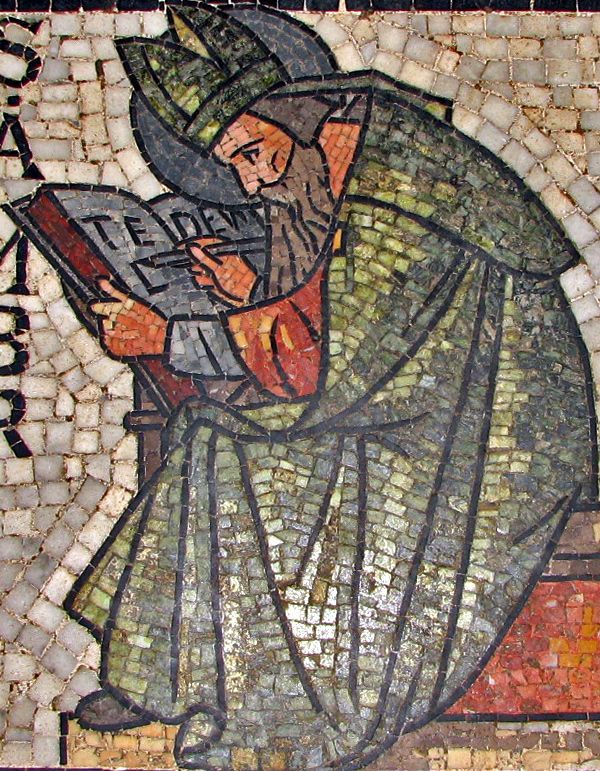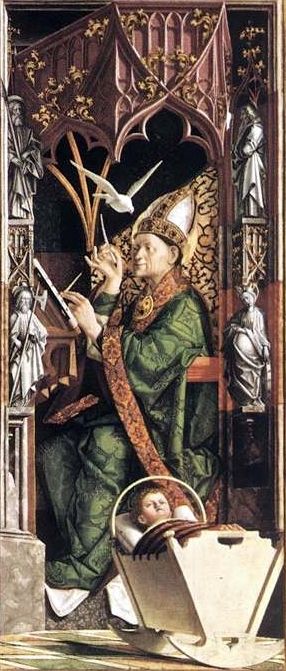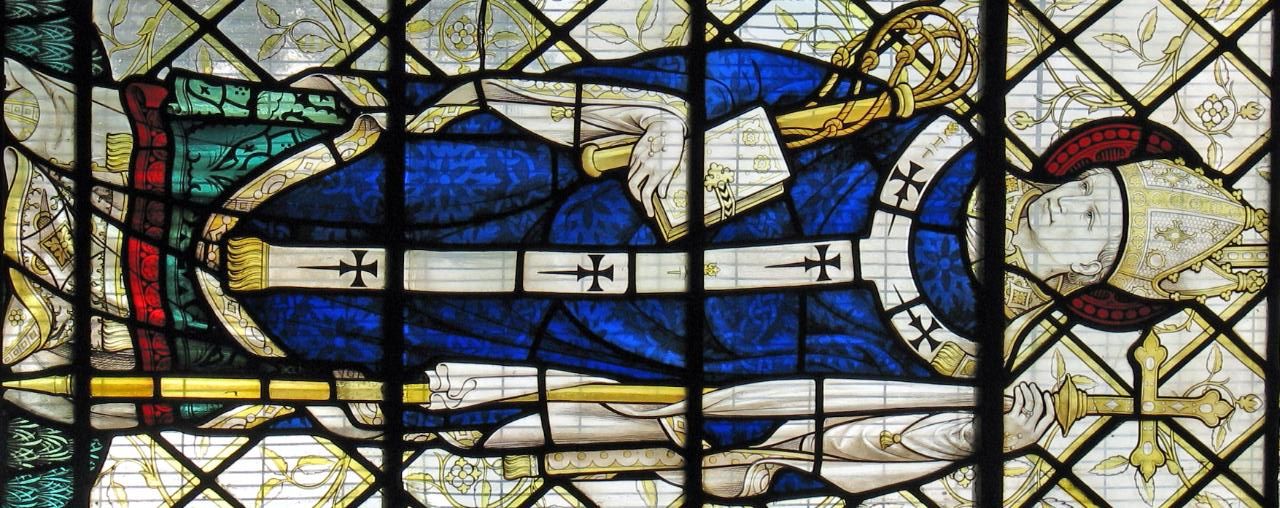Today, December 7, we celebrate the feast day of Saint Ambrose (340-397 ), baptizer of Saint Augustine, and one of the Four Great Doctors of the Church. Saint Ambrose, the “Honey-Tongued Doctor,“ exemplifies for the faithful the truly universal character of Christianity. Fully embracing the learning, law and culture of both those who came before him, as well as that of his contemporaries, Saint Ambrose had a transcendent knowledge and perspective of the world and its activities and riches. Preaching active involvement in the events of daily life, Saint Ambrose reminds us that the true activity we must focus on is the study of the Scripture, and the transcendent freedom that we experience as a result!
Ambrose was born in Gaul, the son of a Roman prefect. As an infant, his parents witnessed a sign of the great things their child would accomplish. While he slept in his crib, bees flew into the nursery and covered his face. His horrified mother watched as they harmlessly flew in and out of his mouth, depositing their honey on his tongue. Afterwards, without harming him, they flew away, continuing so high into the air that they could no longer be seen—almost as if they were returning to heaven. His father proclaimed on that day that Ambrose would accomplish great things.
Ambrose remained with his family until the death of his father, at which time he traveled to Rome, where he received an excellent education. A gifted orator and writer, Ambrose excelled as a lawyer, was recognized for his achievements, and appointed to the position of consular prefect (governor) of two districts of Italy at age 30: Liguria and Aemilia. He grew in fortune, owning a large estate, and befriended the emperor. His life was privileged and he gained much power. Four years later, when the Archbishop of Medialanum died, disputes arose between those attempting to elect an Arian bishop and those desiring an Orthodox bishop. Ambrose, as city official, traveled to the church to resolve the dispute, well aware of the heretical controversy raging.
As was his habit, Ambrose addressed the crowd, and while he was speaking, a child suddenly cried out in a loud, clear voice, “Ambrose for bishop!” The crowd followed suit, and Ambrose (who at that moment was only a Catechumen, having recently discovered the faith), was put up for the position. For his part, knowing the youth of his faith, and overly humble, Ambrose declined the offer, considering himself unworthy (and also considering that being a bishop in those days was quite dangerous!). However, Emperor Valentinian the Elder insisted, and Ambrose dared not refuse. Baptized by an orthodox priest, Ambrose passed through all the ranks of the Church in just seven days, consecrated Bishop of Mediolanum at age 34. He dispersed all his possessions, money and property for the adornment of churches, the upkeep of orphans and the poor, and he devoted himself to a strict ascetic life. Under the direction of Saint Simplician, Ambrose became expert in Scripture and theology.
Ambrose was well-loved by his congregation, keeping a balance between strict orthodoxy, spiritual shepherding, and charitable works. He combined strictness with an uncommon kindliness, and performed miracles of healing through the grace of God. Saint Ambrose was called upon repeatedly to work against heresies, traveling far and wide, but never forgetting or neglecting his flock. As the Arian heretical sect grew in power, they demanded the basilica of Mediolanum be handed over to their power. Ambrose, politely but sternly, refused. His preaching against Arianism, in defense of orthodoxy, was deeply influential.
Ambrose, too, is known for his ransom of captives. When the Goths invaded the empire and took captives, Ambrose paid out all the money he had in ransom. Melting down the Church’s golden ornaments, he said, "It is a better thing to save souls for the Lord than to save treasures. He who sent forth his apostles without gold had not need of gold to form his Church. The Church possesses gold, not to hoard, but to scatter abroad and come to the aid of the unfortunate. Would not the Lord say to us: 'Why have you let so many needy perish of hunger? Since you had gold, you should provide for their needs'...Could we say: 'I feared to leave the temple of God without ornament.' But that which can't be bought with gold does not take its value from gold. The best way to use the gold of the Redeemer is for the redemption of those in peril."
Saint Ambrose was far more concerned for the poor than for power. He often reproached the wealthy for ignoring the poor, saying: "God created the universe in such a manner that all in common might derive their food from it, and that the earth should also be a property common to all. Why do you reject one who has the same rights over nature as you? It is not from your own goods that you give to the beggar; it is a portion of his own that you are restoring to him. The earth belongs to all. So you are paying back a debt and think you are making a gift to which you are not bound."
Saint Ambrose actively spoke out against corruption and heresy in civil matters as well. After sending a copy of his work, “Exposition of the Orthodox Faith,” he was instrumental in Emperor Gracian’s removal of pagan alters from the Senate at Rome. Saint Ambrose further publicly imposed penance on Emperor Theodosius I, for massacring innocents during wartime. As Ambrose stated, no difference existed between rulers and commoners in the eyes of the Lord, and therefore, he would treat them no differently. At his behest, the emperor was not permitted to commune at the alter until he had completed public penance for his actions.
Saint Ambrose attracted many followers to Christ—some traveling great distances. He was visited frequently be scholars from Persia and the East. The Queen of the Germanic tribes (who ironically had attacked the city on more than one occasion) requested that Ambrose instruct her in the ways of Christianity. Following his correspondence, she converted and negotiated peace with the Roman Empire.
Perhaps Saint Ambrose’s most famous pupil was Saint Augustine, also one of the great Doctors of the Church. In Saint Ambrose, Augustine found a learned man, with a firm grasp of the spiritual. His sermons were far more learned than that of other contemporaries, modeled on the rational though of contemporary thinkers and philosophers. His philosophical approach spoke directly to Saint Augustine, who Ambrose personally baptized.
Saint Ambrose died peacefully on the night of the Easter Vigil, surrounded by miracles and apparitions to those being baptized. His remains are buried beneath the main alter of the Basilica of Saint Ambrose in Mediolanum.
The legacy of Saint Ambrose lives on today in the form of his numerous writings. In dogmatic compositions he set forth the Orthodox teaching about the Holy Trinity, the Sacraments, and Repentance: “Five Books on the Faith” (De Fide); “Explication of the Symbol of the Faith” (Explanatio Symboli); “On the Incarnation” (De Incarnationis); “Three Books on the Holy Spirit” (De Spiritu Sancto); “On the Sacraments” (De Sacramento); “Two Books on Repentance” (De Paenitentia). He further wrote about morality, and the balance between knowledge of doctrine and embracing of moral precepts for all those who serve the Church (“On the Duties of the Clergy”). Saint Ambrose further reformed Church music, introducing antiphonal singing (Ambrosian Chant), and composing twelve hymns including the Te Deum.
Saint Ambrose was a firm believer and devotee to Our Blessed Mother. He maintained throughout his life and preaching the perpetual virginity of Mary, further stating that the population increased in direct proportion to the value placed on virginity. Referred to as the “Patron of the Veneration of Mary,” Saint Ambrose laid the foundation for Marian devotion and thinking in the West. He wrote: “The virgin birth is worthy of God. Which human birth would have been more worthy of God, than the one, in which the Immaculate Son of God maintained the purity of his immaculate origin while becoming human?” and “We confess, that Christ the Lord was born from a virgin, and therefore we reject the natural order of things. Because not from a man she conceived but from the Holy Spirit.”
Saint Ambrose gave up all he had to follow the call of the Lord. In his God-given gifts, he brought many to Christ and defended the orthodoxy of the true Church. Throughout his preaching and writing, Saint Ambrose reminds us of our spirit—the Spirit—which lifts us beyond this world to a higher plane of praise and communion with the Lord. We are challenged today to elevate ourselves, living the principles that Christ taught, and fully experiencing the love of our gracious God.
Selected Quotations of Saint Ambrose:
“No one heals himself by wounding another.”
“Our own evil inclinations are far more dangerous than any external enemies.”
“But if these beings angels guard you, they do so because they have been summoned by your prayers.”
“The Church of the Lord is built upon the rock of the apostles among so many dangers in the world; it therefore remains unmoved. The Church’s foundation is unshakable and firm against assaults of the raging sea. Waves lash at the Church but do not shatter it. Although the elements of this world constantly beat upon the Church with crashing sounds, the Church possesses the safest harbor of salvation for all in distress.
There is a stream which flows down on God’s saints like a torrent. There is also a rushing river giving joy to the heart that is at peace and makes for peace.
He who read much and understands much, receives his fill. He who is full, refreshes others. So Scripture says: “If the clouds are full, they will pour rain upon the earth.”
"Therefore, let your words be rivers, clean and limpid, so that you may charm the ears of people. And by the grace of your words win them over to follow your leadership. Solomon says: “The weapons of the understanding are the lips of the wise”; and in another place he says: “Let your lips be bound with wisdom.” That is, let the meaning of your words shine forth, let understanding blaze out. Let no word escape your lips in vain or be uttered without depth of meaning.”
“To avoid dissensions we should be ever on our guard, more especially with those who drive us to argue with them, with those who vex and irritate us, and who say things likely to excite us to anger. When we find ourselves in company with quarrelsome, eccentric individuals, people who openly and unblushingly say the most shocking things, difficult to put up with, we should take refuge in silence, and the wisest plan is not to reply to people whose behavior is so preposterous. Those who insult us and treat us contumeliously are anxious for a spiteful and sarcastic reply: the silence we then affect disheartens them, and they cannot avoid showing their vexation; they do all they can to provoke us and to elicit a reply, but the best way to baffle them is to say nothing, refuse to argue with them, and to leave them to chew the cud of their hasty anger. This method of bringing down their pride disarms them, and shows them plainly that we slight and despise them.”
Prayer of Saint Ambrose
O God, I who presume to invoke Thy Holy Name, stand in the presence of Thy Divine Majesty: have mercy upon me, a man: a sinner smeared by the foulness of inherent impurity; forgive the unworthy priest in whose hand this oblation is seen offered: Spare O Lord one polluted by sins: in faults the foremost, in comparison to all others, and do not enter into judgment with Thy servant, for no one living is justified in Thy sight. It is true that we are weighed down in the faults and desires of our flesh: remember, O Lord, that we are flesh and there is no other source of help than Thee. Yeah, in Thy sight not even those in Heaven are much more cleansed than we earthly humans, of whom, as the Prophet said of all our righteous acts: we are in comparison as unworthy as a menstrual rag. O Jesus Christ, let us live. O Thou Who dost not will the death of a sinner: grant forgiveness unto us whom Thou hast established in flesh, so that by penitential acts we may come to enjoy eternal life in the Heavens, through our Lord Jesus Christ Who reigneth with Thee and the Holy Spirit throughout all ages of ages. Amen.
Prayer That We May Seek God and Find Him
Lord, teach me to seek you, and reveal yourself to me when I seek you. For I cannot seek you unless you first teach me, nor find you unless you first reveal yourself to me. Let me seek you in longing and long for you in seeking. Let me find you in love, and love you in finding.
Lord,
You made Saint Ambrose an outstanding teacher of the Catholic faith
and gave him the courage of an apostle.
Raise up in Your Church more leaders after Your own heart,
to guide us with courage and wisdom.
We ask this through our Lord Jesus Christ, Your Son,
who lives and reigns with You and the Holy Spirit,
one God, for ever and ever. Amen.
Day 341 of 365
Prayer Intentions: Spiritual Re-awakening.
Requested Intentions: Successful employment and financial assistance for education (M); For the return home of father and husband suffering from mental illness (C); Successful passing of examination; Employment for Son (J); Healing of a family and son (S); Successful marriage (G); End to husband’s addictions; Son’s employment (M); Freedom from financial burdens (M); Healing after a miscarriage (E); For healing of friend; successful resolution of legal matter (A); For unity between estranged friends (E); For a son, falsely arrested (C); Successful employment (J); Successful employment (L); For a healthy child (L); Recovery from stomach illness of a friend (A); Employment and financial security (E); Conversion of sons (L); Freedom from financial stress, employment (C); Spiritual growth and family peace (A); Freedom to immigrate (D); End to debt (N); Restoration of a marriage (J); Complete recovery of son (P); Recovery of parish priest, health of mother, conversion of son (J); Successful employment, end to depression (J); Successful immigration and employment (S); Conversion of an unloving daughter (M); Recovery of husband, health of mother, economic freedom (R); Freedom from depression, restoration of family relationships (N); Restoration of a relationship (J); Healing of friends from cancer (J); Complete healing of a friend with pancreatic cancer (J); Healing of a father following stroke (S).
Why pray the Rosary every day for a year?
Each time the Blessed Virgin has appeared-- whether it be to Saint Bernadette Soubirous at Lourdes; to Lucia, Jacinta, and Francisco at Fatima; or to Mariette Beco at Banneux-- she has asserted the importance, saving grace, and power of praying the Holy Rosary on a daily basis. Based upon her words, the Rosary is penance and conversion for sinners, a pathway to peace, an end to war, and a powerful act of faith in Jesus Christ. Pope Paul VI presented the Rosary as a powerful means to reach Christ "not merely with Mary but indeed, insofar as this is possible to us, in the same way as Mary, who is certainly the one who thought about Him more than anyone else has ever done."
To show us how this is done, perhaps no one has been more eloquent than the great Cardinal Newman, who wrote: "The great power of the Rosary consists in the fact that it translates the Creed into Prayer. Of course, the Creed is already in a certain sense a prayer and a great act of homage towards God, but the Rosary brings us to meditate again on the great truth of His life and death, and brings this truth close to our hearts. Even Christians, although they know God, usually fear rather than love Him. The strength of the Rosary lies in the particular manner in which it considers these mysteries, since all our thinking about Christ is intertwined with the thought of His Mother, in the relations between Mother and Son; the Holy Family is presented to us, the home in which God lived His infinite love."
As Mary said at Fatima, "Jesus wants to use you to make Me known and loved. He wishes to establish the devotion to My Immaculate Heart throughout the world. I promise salvation to whoever embraces it; these souls will be dear to God, like flowers put by Me to adorn his throne."

Subscribe to:
Post Comments (Atom)
























0 comments:
Post a Comment
Thanks for leaving a comment. If you wish to submit a prayer request, however, please do so above, using the "Contact" tab.